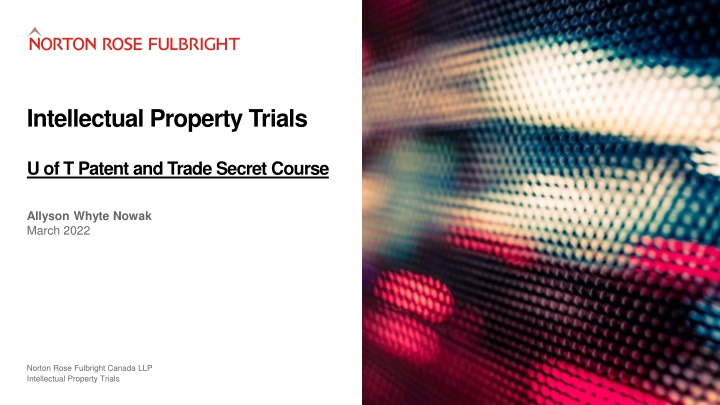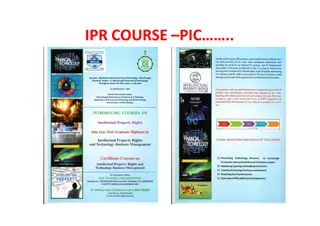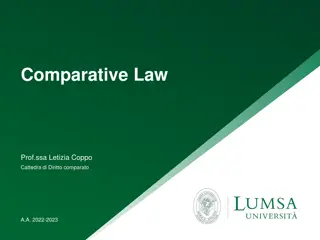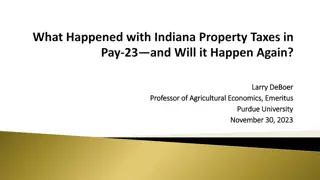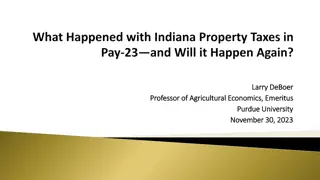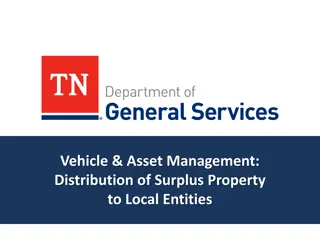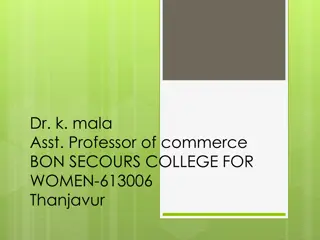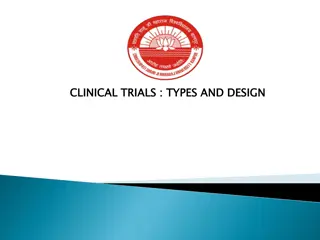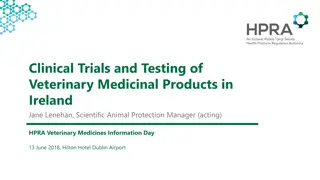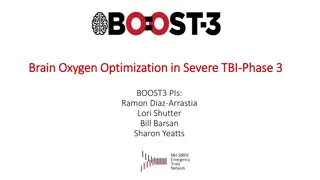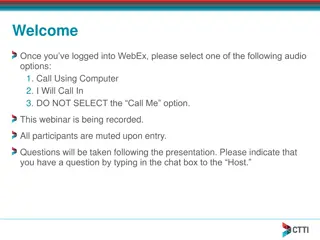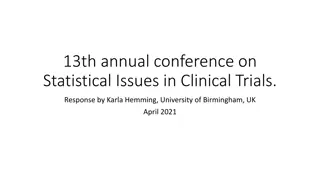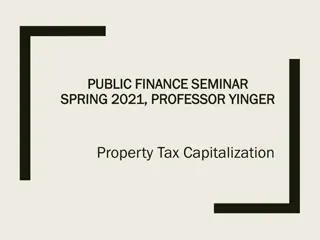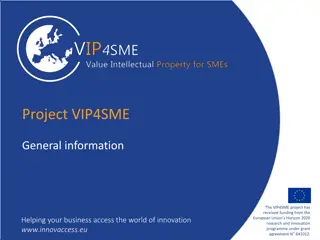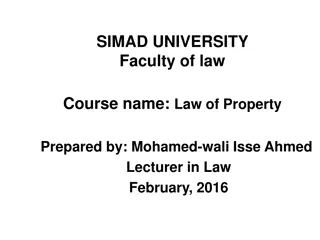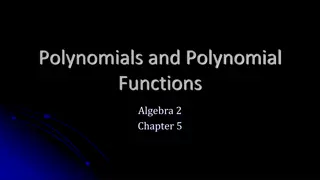Intellectual Property Trials
In the U of T Patent and Trade Secret Course, Allyson Whyte Nowak from Norton Rose Fulbright Canada LLP covers specific trial-related issues, including getting a case to trial and proving your case. Explore a real case involving Spin Master v. Mattel and the steps in a typical patent infringement action. Delve into the timeline of the Spin Master v. Mattel action, showcasing key events from claim issuance to trial settlement.
Download Presentation

Please find below an Image/Link to download the presentation.
The content on the website is provided AS IS for your information and personal use only. It may not be sold, licensed, or shared on other websites without obtaining consent from the author.If you encounter any issues during the download, it is possible that the publisher has removed the file from their server.
You are allowed to download the files provided on this website for personal or commercial use, subject to the condition that they are used lawfully. All files are the property of their respective owners.
The content on the website is provided AS IS for your information and personal use only. It may not be sold, licensed, or shared on other websites without obtaining consent from the author.
E N D
Presentation Transcript
Intellectual Property Trials U of T Patent and Trade Secret Course Allyson Whyte Nowak March 2022 Norton Rose Fulbright Canada LLP Intellectual Property Trials
What We will Cover in Todays Lecture The Specific Trial Related Issues Overview of getting a case to Trial Proving your case importance of pleadings Intellectual Property Trials 2
Viewed in the context of a real case: Spin Master v. Mattel (Federal Court File No. T- 1231-17) Spin Master owns Canadian Patent No. 2,547,539 Patent, Transformable Toys Spin Master sued Mattel for infringement of claims 8-11 by the sale of Mattel s TURNING MECARD toys there were corresponding actions being litigated in the US and the UK Intellectual Property Trials 3
TURNING MECARD Toys Spin Master s BAKUGAN transformer toys were first introduced in 2008 Highly successful franchise accompanied by a card game and anime series Mattel s TURNING MECARD toys were introduced in the downswing of the BAKUGAN franchise history BUT BAKUGAN was about to be relaunched Intellectual Property Trials 4
Steps in a Typical Patent Infringement Action 1) 2) 3) 4) 5) 6) 7) 8) Exchange of Pleadings Exchange of Affidavits of Documents i.e. documentary discovery Examinations for Discovery i.e. oral discoveries Refusals motions Exchange of Expert Reports Pre-Trial and/or Trial Management Conferences Trial Appeal(s) * interlocutory motions and mediation can occur at any stage Intellectual Property Trials 5
Timeline of the Spin Master v. Mattel Action Action set down for Trial April 6, 2018 Claim Issued August 9, 2017 Action Dismissed April 16, 2019 Motion to strike decision released October 12, 2017 Pleadings closed December 2017 Discoveries held in May 2018 Refusals motions held July 2018 Action set down for Trial April 2018 for 10 day trial starting April 1, 2019 Action settled on the eve of trial Intellectual Property Trials 6
Pleadings Frame the Action Documentary Production Discovery Remedies Determine the relevance of documents that must be produced Questions posed must be in relation to unadmitted allegations of fact Pleadings ultimately constrain a Court s ability to deal with an issue Intellectual Property Trials 7
Pleading/Proving an Infringement Case Plaintiff must plead/prove facts to show: i. ownership of the patent ii. a license iii. facts establishing infringement iv. entitlement to relief Defendant must: i. respond to allegations ii. plead facts which negate infringement or constitute a defence to infringement iii. counterclaim to invalidate the patent iv. deny entitlement to relief Intellectual Property Trials 8
Spin Masters Claim Spin Master sued Mattel for infringement of claims 8-11 of the 539 Patent by the sale of Mattel s TURNING MECARD toys Spin Master also alleged that Mattel was liable for inducing infringement as a result of (i) the sale of accessories for the TURNING MECARD toys and (ii) the airing of an accompanying TV anime series Spin Master sought: (i) an accounting of Mattel s profits or damages (ii) delivery up or destruction under oath (iii) injunctive relief (iv) interest (v) costs Intellectual Property Trials 9
Mattels Defence Mattel put in issue the ownership of the 539 Patent Mattel denied infringement Counterclaimed seeking a declaration that the 539 patent including claims 8-11 were invalid as: i) anticipated by the prior art (Schedule A listed 18 prior art references) ii) obvious in light of the prior art (Schedule A ) iii) overbroad iv) a result of a section 53 misrepresentation Similarities, if any, between BAKUGAN and TURNING MECARD brands and their marketing are derived from a common genre dating back to the TRANSFORMERS franchise Mattel relied on a Gillette Defence: if any of the asserted claims 8-11 of the 539 Patent encompass the TURNING MECARD Toys, which is denied, then the asserted claims 8-11 of the 539 Patent are anticipated by the asserted prior art Intellectual Property Trials 10
Case and Trial Management Guidelines for Complex Proceedings Last amended May 18, 2021 Intended to apply to complex proceedings, or proceedings which are expected to require at least five (5) trial days Guidelines address: Electronic documents Discovery planning Limits on discovery Expert evidence Experimental testing Pre-trial preparation New emphasis on the cooperation amongst counsel Intellectual Property Trials 11
Claim 8 of the 539 Patent Transformable Toy Intellectual Property Trials 12
Where the Shoe Pinched [A] latch being provided with a magnet, whereby said releasable latch may be moved out of engagement with said catch by attraction of said magnet to a ferrous or other magnetic metal surface, or a second magnet. The Mattel Mecard toys all include magnets that are designed to interact with metallic cards Mattel argued that: (i) the Mecard Toys have an external lever which causes the latch to release; (ii) the latch in the Mecard Toys is not provided with a magnet ; and (iii) the transformation does not operate according to the principle of operation claimed in claim 8 of the patent. The change in vehicle shape in the Mattel toy was not triggered by the magnet but rather by the act of hitting up against the card the magnet simply allowed the card to be displayed Spin Master argued that: (i) the magnet was involved in the vehicle shape transformation; (ii) the Mecard toys relied on magnetic attraction; (iii) the asserted claims do not state that the magnet in the claimed toy must move and it is not required or appropriate that such restriction must be read into the claims. Intellectual Property Trials 13
Interlocutory Motions Motion to Strike Reply Expert report Discovery motions x2 Motion to Strike Mattel brought a motion to strike portions of the statement of claim Refusals motion Mattel sought Letters of Request Inventors not employees of the plaintiff Inventors resident in Japan Mattel sought to strike portions of the expert report of the accounting expert on the basis that the plaintiff had split its case Intellectual Property Trials 14
Intellectual Property Trials Parties may choose the location of the Trial Trials tend to be longer than in the United States and Europe, lasting on average, between 2-6 weeks There is an informal group of judges with IP expertise who tend to preside over patent actions Parties will know who the trial judge is closer to trial through the conduct of Trial Management Conferences Intellectual Property Trials 15
Trial Management: Rule 270 Two to three months before trial, counsel will meet with the trial judge and set the schedule for the exchange of: witness lists will say statements expert qualifications As well as the delivery to the trial judge of: the trial record expert reports Intellectual Property Trials 16
Spin Master v. Mattel Trial Management Conferences were held in the lead up to Trial December 6, 2019 February 5, 2019 Parties discussed and ultimately jointly filed: Trial record Agreed chronology Joint Statement of Issues Draft anticipated trial calendar Written Outlines for the Parties Openings Intellectual Property Trials 17
Witness Lists How do you select your fact witnesses? They must have personal knowledge of an unadmitted fact Be able to identify a document to be tendered at trial Be able to identify a document as having been made in the usual and ordinary course of business Intellectual Property Trials 18
Spin Masters Witnesses Julia James Martin Andy Truchsess infringement and validity Harington accounting expert SVP Marketing Intellectual Property Trials 19
Mattels Witnesses Ronald Wong Senior Manager (Controller) Mattel Canada Donna Polimac Director Marketing Mattel Canada Ed Duncan Ross Hamilton Barry Kudrowitz infringement and validity SVP, Global Head of Design Boys Action, Games Accounting expert Intellectual Property Trials 20
Will-say Statements In the Spin Master v. Mattel action, the will-say statement of one of Mattel s witnesses might read (in part) like this: Donna Polimac will give evidence relating to: educational and professional background roles at Mattel Canada and as Senior Manager Marketing Boys during the relevant time period responsibilities in her position today and in the relevant time period business of Mattel background to the introduction of the TURNING MECARD toys in Canada Identification and description of marketing and financial documents showing Mattel revenues and costs No witness statements for experts they are confined to what is in their expert report Intellectual Property Trials 21
Statement of Issues for Trial a. Defining the notional Person of Skill in the Art, to whom the Spin Master Patent is addressed; Determining the meaning of Claims 8, 9, 10 and 11 of the Spin Master Patent, as of the date of publication of the patent: August 20, 2007; and What are the Claim Dates for Claims 8, 9, 10 and 11 of the Spin Master Patent? 1. Claims Construction of the 539 Patent b. c. Intellectual Property Trials 22
Statement of Issues for Trial (contd) 2. Infringement Do the MECARD toys, including the Alta, Phoenix, Crang, Tador, Geryon and Andromagician toys, that have been sold by Mattel in Canada, infringe the 539 Patent: Are the essential elements of each of Claims 8, 9, and 10 of the Spin Master Patent found in each of the Mattel MECARD toys? Are the essential elements of Claim 11 found in certain of the identified Mattel MECARD Toys? Intellectual Property Trials 23
Statement of Issues for Trial (contd) Are claims 8, 9, 10 and 11 of the 539 Patent invalid for anticipation was the subject matter of those claims previously disclosed in view of six different prior art references and the common general knowledge of a person skilled in the art: 3) Validity of the 539 Patent Matsuda (MAT131): Japanese Examined Utility Model Publication; Jan 5, 1994 Honda (MAT134): Japanese Unexamined Utility Model Publication; Nov 10,1989 Wilhelm (MAT20): US Patent 6,592,427; Jul 15, 2003 Poulain (MAT132): French Patent Application; 01/07/1977 Tomiyama (MAT133): Japanese Utility Model Publication; May 15, 1963 Aprile (MAT23): PCT Patent Application; May 18, 2006 Anticipation Intellectual Property Trials 24
Statement of Issues for Trial (contd) Are claims 8, 9, 10 and 11 of the Spin Master Patent invalid for obviousness was the subject matter of those claims obvious in view of the asserted prior art alleged to be relevant: (Kobayashi (MAT7), Maruyama (MAT11), Shannon (MAT19), Saucier (MAT22)) or, in combination with the common general knowledge. Including: determining what specific toys, or parts or structures shown in commercialized toys, if any, form part of the common general knowledge of a Person of Skill in the Art as of the Claim Date of the Spin Master Patent 3. Validity Obviousness Intellectual Property Trials 25
Statement of Issues for Trial (contd) 4) Validity Are Claims 8, 9, 10 and 11 invalid by virtue of being broader than the invention disclosed or made? Overbreadth Intellectual Property Trials 26
Statement of Issues for Trial (contd) If Spin Master is successful in establishing infringement by Mattel of a valid claim of the Spin Master Patent, is Spin Master entitled to the following remedies: a. Mattel s profits arising from the period in which Mattel was actively in the market with the MECARD toys found to have infringed or convoyed with the toys found to have infringed, and if so, what is the appropriate quantum? b. Permanent injunction with respect to the toys found to have infringed c. Delivery up/destruction with respect to the toys found to have infringed d. Pre-judgment and post-judgment interest e. Costs Remedies Intellectual Property Trials 27
Proving Your Case at Trial Admissions Pleadings Discovery read-ins Request to Admit (Rule 255) Agreed Statement of Facts Viva Voce Evidence Witnesses (fact or expert) Commission evidence Rule 271 Documentary Evidence Documents (need to be properly authenticated and accepted as proof of the truth of its contents) Experimental Testing distinguishable from a demonstration Must be in accordance with the Federal Court case and Trial Guidelines for Complex Proceedings Intellectual Property Trials 28
Experimental Testing If a party intends to establish any fact in issue by experimental testing conducted for the purpose of litigation in a patent infringement or impeachment action, it shall no later than 2 months before the scheduled service of the expert report(s) to which the testing relates, provide reasonable notice to the other parties as to: the facts to be proven by such testing; the nature of the experimental procedure to be performed; when and where the adverse parties counsel and representative(s) can attend to watch the experiment(s); and when and in what format the data and test results from such experiment(s) will be shared with the adverse parties. Otherwise a party needs leave of the Court to lead evidence at the trial or hearing as to any experiments conducted by or for it for the purpose of the litigation. Intellectual Property Trials 29
Spin Master v. Mattel Draft Trial Calendar Intellectual Property Trials 30
Documentary Evidence There are 2 issues to be addressed: 1. Authenticity tends to be by way of agreement of the parties alternatively, you need to call a witness to testify that he or she prepared or received the document can be done through a discovery admission, agreement or Request to Admit fairly routine 2. Proof of the truth of their contents issue is tied to the rule against hearsay can be dealt with by agreement of the parties but still need a witness or some other means to tender the document into evidence Intellectual Property Trials 31
The Conduct of a Patent Trial The Plaintiff s Case Opening by the Plaintiff Plaintiff leads evidence establishing Ownership of the patent Status of the licensee as a person claiming under the patent Facts establishing infringement (can be by way of admissions, witnesses, discovery read-ins) Expert evidence on the construction of the patent and infringement Intellectual Property Trials 32
A Patent Trial (contd) The Defence Defendant can choose to make an opening after the Plaintiff or choose to wait until the close of the Plaintiff s case on infringement The Defendant responds to the evidence on infringement (cross-examination of the Plaintiff s witnesses and calling of its own expert and/or fact witnesses) The Defendant leads evidence on the issues of invalidity (expert and/or fact witnesses and possibly by way of admissions and discovery read-ins) Intellectual Property Trials 33
A Patent Trial (contd) The Plaintiff s Case in Defence to Invalidity and Reply The Plaintiff responds to the evidence on invalidity (cross-examination of the Defendant s witnesses and calling of its own expert and/or fact witnesses) Reply evidence (Rule 278(2)) Closing arguments by Plaintiff and Defendant with right of reply Intellectual Property Trials 34
Trial Specific Issues - Reply Evidence Rule 278(2) A party shall have a right of reply to the arguments of adverse parties and if the party raises a new point of law, an adverse party may answer on that point. Application of the Rule Plaintiff must exhaust evidence in the first instance Permitted only where necessary Confirmatory evidence not permitted Intellectual Property Trials 35
Opening Statements A Flavour Spin Master Mattel Mattel expects that Spin Master will make much of Mattel's knowledge of Bakugan's success and suggest to the Court that Mattel wilfully brought the Mecard Toys to market in Canada with full knowledge of Bakugan and its success, and the 539 Patent. Mattel does not shy away from these facts. This Court has held that there is nothing inherently improper in emulating a successful business model. This litigation is based on Spin Master s allegation that Mecard toys are covered by one of more of the Spin Master Patent claims, and therefore Mattel has infringed the patent by selling the toys in Canada. The Spin Master Patent describes a transformable toy with a magnet that is designed to interact with a metallic card ( M below) so that the toy will transform. The plaintiff patentee in this case is a successful Canadian toy company, competing in a global market. The corporate representative who will testify at trial about the plaintiff Spin Master Ltd. ( Spin Master ) is James Martin. Mr. Martin will describe the history and success of the Canadian company Spin Master. He will explain how Spin Master has built its business on innovation and how intellectual property and patent rights are a central and crucially important part of that business. It will be Mattel's submission that the Supreme Court's warning in Free World Trust is particularly apt in this case: As stated, the ingenuity of the patent lies not in the identification of a desirable result but in teaching one particular means to achieve it. The claims cannot be stretched to allow the patentee to monopolize anything that achieves the desirable result. It is not legitimate, for example, to obtain a patent for a particular method that grows hair on bald men and thereafter claim that anything that grows hair on bald men infringes. Intellectual Property Trials 36
Trial Specific Issues - Expert Reports Code of Conduct General duty to the Court overriding duty to assist the Court impartially must be independent and objective Contents of an expert report Statement of issues Qualifications (CV) Facts and Assumptions Summary of Opinions Points of Agreement/Disagreement Reasons for Opinion Documents Relied On Summary of Methodology Intellectual Property Trials 37
Expert Issues s.7 fair Canada Evidence Act Code of Conduct Rule 52.2 objective and non- partisan evidence Drafting expert reports Blinding Intellectual Property Trials 38
Blinding Justice Zinn "this court has recognized that evidence from experts who have not seen the patent nor been apprised of the positions of the litigants is to be given greater weight on issues going to obviousness and patent construction than the evidence of an expert with full knowledge of the patent's disclosure and the positions of the parties (AI!ergan Inc. v. Apotex Inc., 2016 FC 344 at para 13). Justice Locke "I agree with Shire that favouring the evidence of experts who have been blinded has not been raised to the level of a legal principle that must be applied in all cases, and is merely persuasive ... I am mainly interested in the substance of an expert's opinion and the reasoning that led to that opinion. Intellectual Property Trials 39
Hot Tubbing in the Federal Court In Apotex Inc. v. Astrazeneca Canada Inc. 2012 FC 559, Justice Hughes described the procedure flowing from Rule 282.1 as follows: At the end of the testimony of Ms Wehner and Dr. Garven I conducted a "hot tubbing" examination in which each of them took the stand at the same time, remaining under oath. They answered questions put to them by me and responded to the answers given by each other. At the end of this process, each Counsel was invited to put follow-up questions to these witnesses. Intellectual Property Trials 40
Law around the world nortonrosefulbright.com Norton Rose Fulbright US LLP, Norton Rose Fulbright LLP, Norton Rose Fulbright Australia, Norton Rose Fulbright Canada LLP and Norton Rose Fulbright South Africa Inc are separate legal entities and all of them are members of Norton Rose Fulbright Verein, a Swiss verein. Norton Rose Fulbright Verein helps coordinate the activities of the members but does not itself provide legal services to clients. References to Norton Rose Fulbright , the law firm and legal practice are to one or more of the Norton Rose Fulbright members or to one of their respective affiliates (together Norton Rose Fulbright entity/entities ). No individual who is a member, partner, shareholder, director, employee or consultant of, in or to any Norton Rose Fulbright entity (whether or not such individual is described as a partner ) accepts or assumes responsibility, or has any liability, to any person in respect of this communication. Any reference to a partner or director is to a member, employee or consultant with equivalent standing and qualifications of the relevant Norton Rose Fulbright entity. The purpose of this communication is to provide general information of a legal nature. It does not contain a full analysis of the law nor does it constitute an opinion of any Norton Rose Fulbright entity on the points of law discussed. You must take specific legal advice on any particular matter which concerns you. If you require any advice or further information, please speak to your usual contact at Norton Rose Fulbright.
